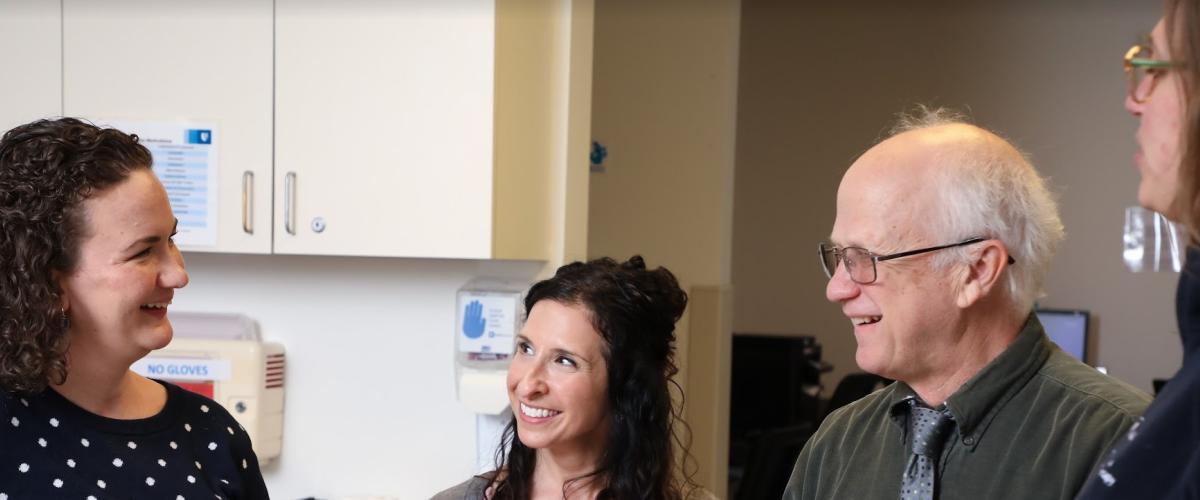
The Duke Movement Disorders Clinic conducts a variety of clinical trials to continually seek out better treatments for those affected by movements disorders. If you are interested in participating in any of these trials, please email movdisres@dm.duke.edu.
Parkinson's Disease
- Cerevance/ASCEND: This is an oral treatment being studied to help manage both motor and non-motor symptoms of Parkinson’s disease.
- DBS Predictive Study: The study aims to evaluate Parkinson's disease patients considering Deep Brain Stimulation (DBS) during OFF/ON evaluation. It involves collecting data points throughout the DBS workup and utilizing a smartwatch to track symptoms before and after the DBS procedure. The study involves two visits; one before the DBS procedure and another during the first DBS programming session.
- PDGeneration: Is a nationwide program that provides free genetic testing for key Parkinson's-related genes, along with genetic counseling, for individuals diagnosed with Parkinson’s disease (PD). Participants can join remotely by enrolling online and using an at-home blood collection kit.
- DCRI/Allyx: A novel oral treatment aimed at protecting synapses in patients with Parkinson's Disease. This study is a 28-day trial for Parkinson's Disease in which adults aged 21-80 receive either 50 mg or 100 mg of the trial drug twice daily or a placebo. Through its unique mechanism targeting neurodegeneration, the study seeks to advance the understanding of disease-modifying therapies.
- Video Recording and Machine Learning Analysis of Movement Disorders: This study aims to use computer vision and machine learning to develop video-based quantitative metrics for movement disorder symptoms.
- Parkinson's Disease in Hispanics: Neurocognitive Impairment and Cardiovascular Risk: This study aims to explore factors affecting cognition, such as memory and thinking skills, in individuals with Parkinson's Disease from diverse backgrounds, to inform future interventions. Participation involves a 4–5-hour visit (which can be split into multiple sessions) in which we complete interviews, questionnaires, cognitive tests, a physical exam, and a blood sample.
- Ask Bio: The study aims to evaluate adults with moderate Parkinson's disease by testing a new gene therapy called AAV2-GDNF, which is delivered directly into a part of the brain called the putamen. It involves comparing people who receive the gene therapy through surgery with those who undergo a control surgery without the treatment. The study tracks safety and looks at how well the therapy improves movement symptoms over 18 months, using patient diaries to measure changes in "good" ON time and OFF time.
Dystonia
- Dystonia Biomarker Discovery: This study aims to identify biomarkers for dystonia to improve diagnosis, predict disease severity, and guide treatment. We are especially seeking individuals with DYT1 and their family members, affected or not, to participate. The study involves a single visit of up to one hour, including a blood draw and a brief questionnaire.
- Accelerated TMS for Cervical Dystonia: This research aims to explore the efficacy of employing several sessions of transcranial magnetic stimulation, a non-invasive therapeutic method, to mitigate neck dystonia.
- Accelerated TMS for Focal Hand Dystonia: This study is investigating the potential of utilizing multiple transcranial magnetic stimulation sessions, a non-invasive therapeutic approach, to alleviate dystonia affecting the hand.
Huntington's Disease
- ENROLL-HD: ENROLL-HD is an observational study for patients with Huntington’s disease and their families.
Multiple System Atrophy (MSA)
- TEVA-MSA: This study is testing an investigational medication called TEV-56286 to see if it can help people with Multiple System Atrophy (MSA). The study will also look at the safety of the medication and how well people tolerate it. Participation lasts about 56 weeks and includes regular visits over about a year. During the study, participants will take capsules once daily (either the study drug or a placebo) and complete health check-ups, questionnaires, and physical and neurological exams.
Progressive Supranuclear Palsy (PSP)
- PROSPER: This trial is testing a new disease-modifying medication for Progressive Supranuclear Palsy (PSP). This medication works to prevent the buildup of a toxic protein called "p-tau" which is believed to cause PSP.